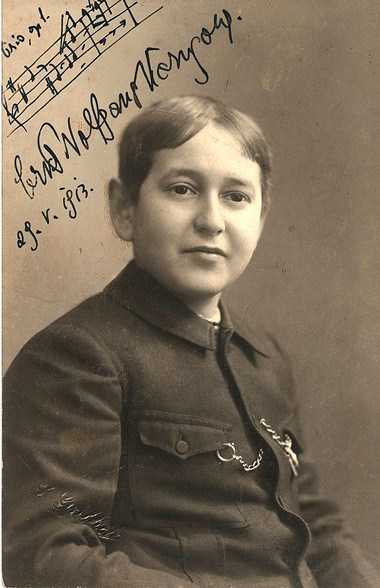
Browsing through some music videos the other day, I came across a performance by a violinist of about six years old who was described as a “child prodigy”. He was quite talented, but he wasn’t a child prodigy. Nowhere near. I’ve just been re-reading the fascinating book by Claude Kenneson called Musical Prodigies in which he writes, “I was a gifted child but certainly not a prodigy. There is a vast difference between the two. One is sometimes remarkable, the other always phenomenal, startling to witness.”
In more prosaic terms, a child prodigy is usually defined as someone who has reached adult or even professional levels of performance before the age of ten. The pianist Van Cliburn, who started playing piano at the age of three, once described child prodigies as “having extraordinary vision and unusual prescience, amazingly aware of the world at an early age.”
There are child prodigies in many different subject domains, especially mathematics and science, but music seems to have more than its fair share. Composers who were child prodigies included Barber, Bizet, Chopin, Menotti, Paganini and Purcell. The most famous perhaps were Mozart and Mendelssohn. Science knows remarkably little about the mental functioning of these extraordinary beings, though there is no shortage of theories.
The issue inevitably brings up the time-worn “nature vs. nurture” debate, which is about whether potential high levels of skill are already present when the child is born, or whether they’re brought about by the child’s early environment. The latest thinking seems to indicate that both nature and nurture have a role to play.
Psychologist Joanne Ruthsatz of Ohio State University has estimated that there’s one child prodigy to every five million, or possibly ten million other children. The Ohio research has shown that a common denominator among these gifted children is an exceptional working memory. They also have an intense attention to detail, an elevated general intelligence and interestingly, they tend to be far more altruistic than most other people. Contrary to popular belief, child prodigies don’t usually fade away in their adult years. Many prodigies have lived into their eighties and nineties and continued performing careers until towards the end of their lives.
Felix Mendelssohn (1809-1847): Concerto for Piano, Violin & Strings in D minor. Anna Savkina (vln); Anna Denisova (pno); Kremlin Chamber Orchestra cond. Misha Rachlevsky (Duration 1st mvt: 18:33, Video: 1080p HD)(3 videos)
The German poet Johann Wolfgang von Goethe considered the young Mendelssohn superior to Mozart at the same age. In 1823, when Mendelssohn was fourteen, he wrote this sparkling double concerto in three movements. The music is imbued with the Romantic spirit and there are some delightful melodies and some brilliant virtuosic passages. It’s a remarkable work for a fourteen-year-old and offers many glimpses into the composer’s more mature musical style.
For some odd reason, the young Russian musicians in this recording are positioned in such a way that the pianist can see neither the conductor nor the violinist. Even so, the performance is confident and technically assured with an impressive sense of ensemble.
Gustav Mahler described the young Korngold as a musical genius. At the age of eleven, Korngold composed his ballet Der Schneemann (“The Snowman”), which was first performed by the Hamburg Radio Symphony Orchestra in 1910. It’s an amazingly complex work for one so young.
The Sinfonietta, his first large-scale orchestral composition, dates from 1912 when Korngold was fifteen. Such was the enormous fame of the young composer that the work was first performed by none less than the Vienna Philharmonic Orchestra under the renowned Felix Weingartner. The brilliantly orchestrated work is remarkable in its maturity and really sounds as though it was written by someone with many more years’ experience. There are some wonderful melodies and the beginning of the scherzo (at 11:17) is almost pure Hollywood.
Korngold of course later went to Hollywood and became a very fine composer of film music. It’s sometimes said that he “invented” film music because he treated each movie as an “opera without singing”, writing sumptuous melodies and contrapuntally intricate scores. He wanted his music to stand alone in the concert hall and although his musical style sounds a bit dated nowadays, he had a significant influence on film music.
In 1938 he won an Academy Award for his score to The Adventures of Robin Hood, the first composer to receive one. Even so, he became disillusioned with the movie industry and in 1946 stopped writing film scores altogether, turning his attention to writing music for the concert hall. But his music remained stylistically in the nineteenth century and one American critic unkindly described Korngold’s Violin Concerto as being “more corn than gold”. Honestly, how bitchy can you get?
 |
 |
 |




